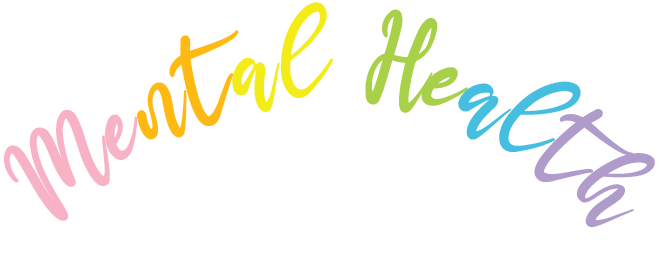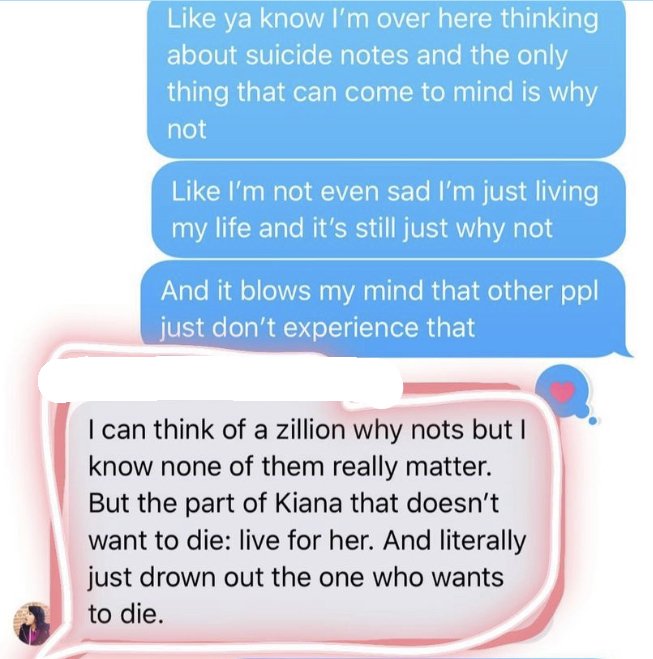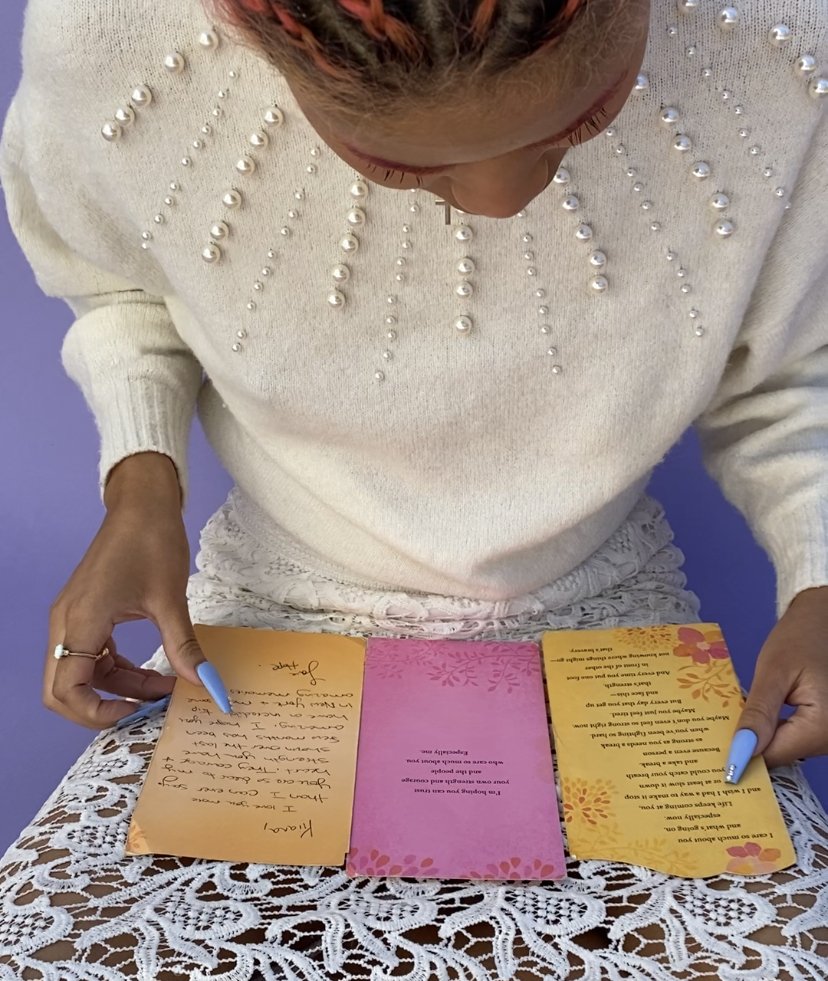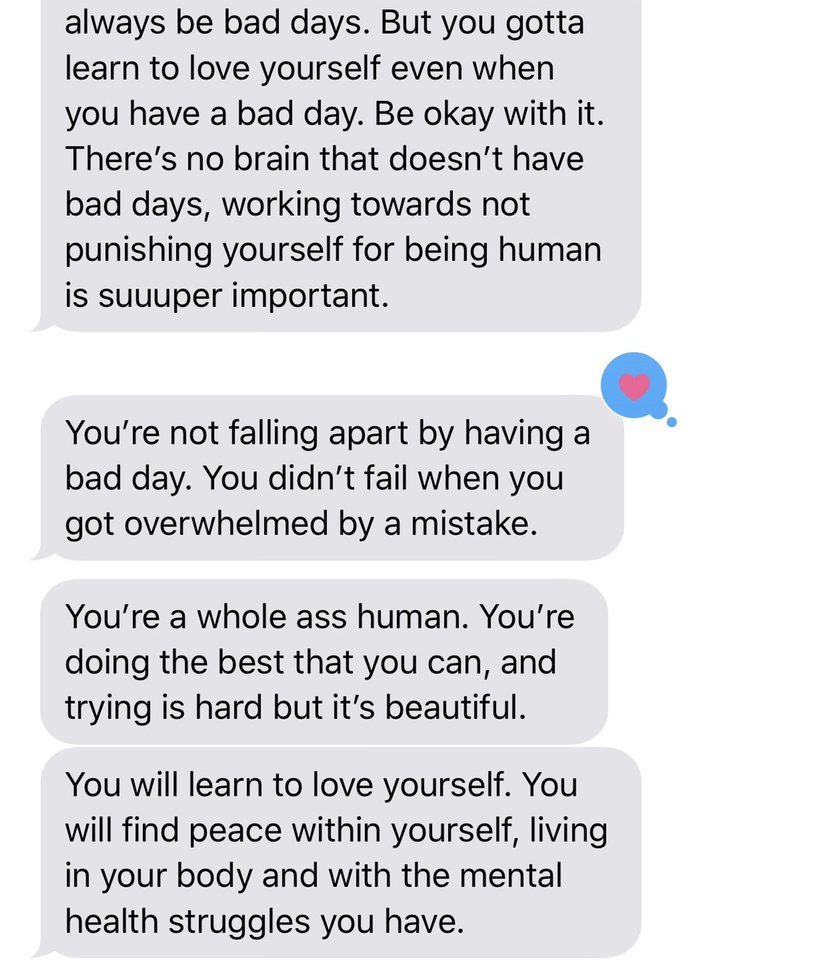Things Your Suicidal Friend Wants (You) to Hear
I have an uncle that insists I didn’t try to kill myself.
“I talked to you that day and you sounded fine.” (It was a three-bubble-long conversation over text.)
I don’t know what he gets out of this pretending, but I do know that when he first said that to me I was still very much chronically suicidal.
“Well, let me try a little harder next time.” is exactly what I thought. Never mind that I had committed a felony in my quest to end my life, I hadn’t done enough to be taken seriously (by him.)
Plenty of other people, people who were present with me that night, took me seriously and cried silent tears beside me as I wailed and wailed in the church parking lot.
I felt there were many warning signs early on that hadn’t been taken seriously and I’m glad I could set the record straight.
I’m hurting. I’m hurting. I’m hurting. And I’m crying out.
My therapist at the time, a Christian woman, saw me after I got out of the hospital and I told her what happened. She instantly started giving up praise of thanksgiving that I still had my life. I sat there awkwardly because I was less thrilled at the prospect of my continued existence. When she sat back down from her praise break she asked me if I finally felt heard. I asked what she meant by that and she said, “Kiana, you did what you did because nobody was listening to your pain. That was the reason you felt you had to take such drastic measures. Are the people in your life paying attention now?”
Text messages that saved my life.
I know someone who once referred to people who self-harm as “attention-seeking” and I hated that. There’s a saying on the internet somewhere that said “replace ‘attention-seeking’ with ‘connection-seeking.’” I don’t think it needs replacing. We all need attention to survive because we depend on other people for survival, no matter how independent we are. I think if you are in community with somebody you’re allowed to make demands for their attention when you need it. I think our individualistic culture would have us think that we don’t owe anybody our time and attention and that mindset is wrong. Malcolm X said it best: “when we replace ‘I’ with ‘we’, illness becomes wellness.” We need our community. We need our community to hear and, at times, see through us.
Text messages that saved my life.
I hadn’t even considered that being ignored triggered me, and prompted me to act so recklessly. But to answer her question, yes. I finally felt like the depths of my pain were understood by my community.
But just because people understood did not mean they knew how to react to it. And just about everyone was imperfect at it. In that period of time, I was massively disappointed in a lot of people.
I needed to be smothered in love. I needed to be smothered in support. I needed constant reminders that I was valuable and when I received them, I clung to them until the force of my grip turned them into dust. Case in point, a card from my best friend, Hope, that I carried around and reread so often that it tore at the folds.
Even beyond the immediate aftermath of my failed attempt, I needed a change of environment. I needed a vacation. I needed my sister who lived in New York to offer to house me for the summer and fill my days with adventure.
Time would move on but the feeling persisted and I needed friends who would come over and fold my laundry or clean my room because I couldn’t.
I’ve needed constant prayer. I’ve needed random texts of encouragement. I’ve needed pep talks every other day. I’ve needed people to physically help me get out of bed on days when I had places to be and a weight in my chest that felt like I had been staked to the bed, rendering me immobile.
Text messages that saved my life.
I’ve written a blog about how to help a friend through an acute suicidal crisis, but when their suicidal feelings are ongoing, what do you do?
As a chronically suicidal person at what point do you reach out for help?
The thoughts never leave for long. Must you alert the press whenever one occurs or should you wait until you’re on the precipice of taking action?
Text messages that saved my life.
To answer for myself: Kiana, when you’re laying in bed for fear that moving will bring you in a direction to harm yourself, it’s too late. You should have spoken up sooner. When you started thinking about specific scenarios, you should have reached out. You should have trusted people who want what’s best for you to be there for you, even when they show up imperfectly.
For the people who show up imperfectly: keep showing up. It means a lot. Surround that person with love and understanding. You may not understand, but you can still validate their feelings. Their battle is real even when you can’t fathom it. Remind them that they have purpose. Remind them that they are loved. Show them that they’re not invisible. Remind them that even though it may be long-lasting, the pain is temporary. It will get better. They will be okay. Believe for them even when they don’t have faith for themself. Share that faith with them. It can rub off even in tiny doses and plant seeds of hope. Hope they can cling to.
Christians especially love to quote scripture. Don’t just tell someone that God has plans to give them a hope and a future, actively imagine what their future might look like and share it with them. Remind them that it is possible because they’re alive to make it so.
Text messages that saved my life.
Let your friend know that you’re not afraid of their darkness. It doesn’t deter you and you will sit with them. You will sit with them until your eyes adjust. When they’re ready, you’ll light a candle and wait for their eyes to adjust. You won’t blind them with rays of brilliant sunshine and toxic positivity during their depression.
Text messages that saved my life.
Most of all, tell your friend that you’re in it for the long haul. However long it takes until those feelings go away. Let them know that suicide prevention is not just a month-long fad to you. Let them know that you won’t just direct them to a hotline number but that you’ll be the hotline number. I promise you that even in your imperfect response, your words and your presence will do more to deter them from tapping out than that of a stranger who would probably just call the police on them anyway. At the end of the day, it’s not so much that your suicidal friend wants to hear any one thing, it’s that your suicidal friend needs to be heard. Be an ear, and be a shoulder to lean on.
S/O To Ashleigh for editing this post.
If you find this post valuable and believe in the mission of Mental Health Tings and would like to partner with us financially, you can make a one time donation by clicking this button or subscribe to our $10/month Patreon tier: Here for the Blog.







